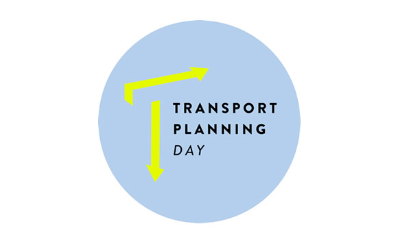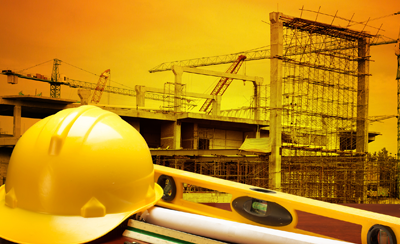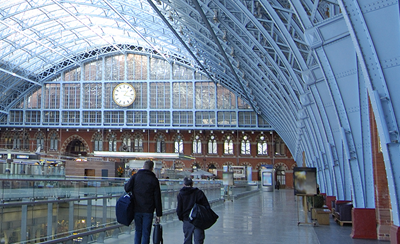Roads v Rail: Reducing carbon emissions by 2030:28 January
28 Jan 2021 12:30 to 14:00
Climate change is the most pressing environmental challenge of our time. Taking action is a clear priority for the Government. In June 2019 the UK government passed a law that requires them to achieve 'net zero' greenhouse gas (GHG) emissions by 2050. Transport has a huge role to play in the economy reaching net zero. The scale of the challenge demands a step change in both the breadth and scale of ambition and as a country we have a duty to act quickly and decisively to reduce emissions.
The Department for Transport is currently developing a decarbonisation strategy for the transport sector. This is to be published in spring 2021. In its paper Decarbonising transport: setting the challenge it states that current plans and policies will not achieve the reduction in emissions that is needed if transport is to play its part in contributing to our legal obligation to “net zero” carbon emissions by 2050. One particular cause for concern is the large-scale road-building programme.
Road transport is the largest emitter of GHG. Cars contributed 55% of domestic transport emissions (68MtCO2e) in 2018. Rail on the other hand is a relatively low-carbon form of transport, and is one of the most efficient ways of moving high volumes of people into city centres and moving people over long distances. In 2018, GHG emissions from rail (passenger and freight) made up just 1.4% of the UK's domestic transport emissions, while 10% of passenger miles travelled in Great Britain were by rail. The railway is becoming less carbon intensive as new trains come into service and the railway uses greener electricity.
The first presentation is a paper by Lynn Sloman and Lisa Hopkinson which uses carbon data reported by Highways England to make, for the first time, a programme-level estimate of the likely carbon impact of the government’s second Road Investment Strategy, RIS2. In our second presentation, Stephen Hart, Lead Strategic Planner from Network Rail, will talk about the role of rail in supporting decarbonisation of the UK economy and what rail is doing to achieve the legislative decarbonisation targets.
In our discussion we will be asking presenters and panellists how difficult it is to reduce carbon in transport and what each industry (highways and railways) could do to help achieve the targets the UK government committed to.
The conversation will be framed with the following questions:
- How can we accelerate decarbonisation of the transport network to achieve the 2030 target?
- What is the carbon impact of the government’s proposed roads programme and how does this align with its climate change commitments?
- How do we properly account for carbon impacts of road schemes in transport planning assessments?
- How could we re-purpose roads funding to address the COVID-19 and climate emergencies?
- What is the role for rail in decarbonisation of the transport sector?
- How can rail reduce its carbon emissions further and faster?
Speakers:
Event Chair: Stephen Bennett - Director, Arup
Stephen Bennett is passionate about transport planning and the role it plays in improving the lives of people in society. He is a Director of the Transport Planning Society and is involved in the Society’s work in all areas, covering skills, events, membership, policy, communications and working with partner organisations. He is also a Director at Arup, where he specialises in major public transport programmes and strategic multi-modal transport plans and leads a fantastic team of nearly 100 transport consultants.
Lynn Sloman – Director, Transport for Quality of Life
Lynn Sloman is Director of Transport for Quality of Life, a research consultancy and think-tank which undertakes work that contributes to achieving an environmentally sustainable and socially equitable transport system. She is also a Commissioner for the South East Wales Transport Commission, Board Member of Transport for London, and trustee of the Foundation for Integrated Transport. She has led a number of ground-breaking evaluations of sustainable transport investment programmes for the Department for Transport, helping our understanding of how transport investment can achieve social, economic and environmental goals. She also led two studies for CPRE to evaluate the impact of road-building on carbon emissions, biodiversity, landscape, safety and local economies, which found that the benefits of road schemes are short-lived and over-stated, while the dis-benefits are large and permanent. She is interested in how to re-purpose Highways England with a new role that is appropriate to the climate emergency. She splits her time between London and deepest rural mid-Wales, where she lives (very happily!) without a car.
Steven Hart - Lead Strategic Planner, Network Rail
Steven joined Network Rail in 2013, following the completion of a Masters degree in Programme and Project Management at Warwick University. After time spent in Infrastructure Projects, developing and delivering a number of major infrastructure enhancements, he is now a Lead Strategic Planner for Freight and National Passenger Operators within NR’s System Operator function. Steven has recently lead the successful completion of the Traction Decarbonisation Network Strategy.
Lisa Hopkinson – Associate, Transport for Quality of Life
Lisa Hopkinson is an environmental researcher with over 30 years experience in Hong Kong and the UK in the charitable, educational and private sectors. She co-founded Civic Exchange, a public policy thinktank in Hong Kong; evaluated the impacts of sustainable transport projects; managed a transport behavioural change project; and conducted numerous environmental and transport-related research studies, projects and events. She has degrees in environmental chemistry and environmental technology from the University of York and Imperial College.
Julian Worth – Chair, CILT(UK) Rail Freight Group
Julian Worth has spent 41 years in the rail freight industry in a wide variety of roles, including Managing Director, Transrail Freight, and Marketing Director, English Welsh & Scottish Railway. He now works with a range of clients in the private and public sectors, providing strategic advice on rail-based logistics. He also writes on rail freight matters and speaks at conferences in the UK and abroad. Julian is Chair of the CILT Rail Freight Forum and is a member of the Freight & Logistics and Strategic Rail Policy Groups.
About this event:
This event is jointly hosted by CILT(UK) and the Transport Planning Society (TPS). Organised by PTRC Education and Research Services.
How to Book
To book for this event go to the Eventbrite link
Events Calendar
2024
|
Aug
|
|||
|
Dec
|
TPS is supported by
Web design by Tribal Systems












